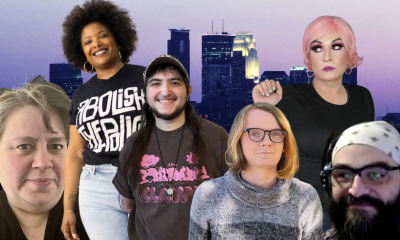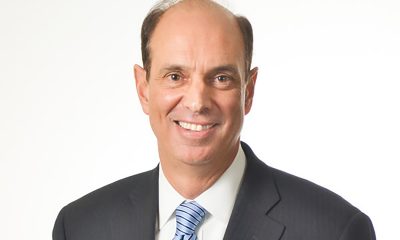World
Out in the World: LGBTQ news from Canada, Asia, and Europe
Another Japanese court has ruled the country’s same-sex marriage ban is unconstitutional

CANADA
The mayor of Emo, Ontario, had his bank account garnished after he announced he would refuse to pay court-ordered damages of $5,000 to a local Pride organization.
The drama started in 2020 when the small town of 5,000 people about 1,000 miles northwest of Toronto on the border with Minnesota refused a request by Borderlands Pride to issue a proclamation declaring June Pride Month in the town and fly a rainbow flag for a week.
The town council voted down the request in an acrimonious debate in which now 76-year-old Mayor Harold McQuaker argued that flying the Pride flag was unfair because there’s no flag for “the other side.” Borderlands Pride then presented a petition asking the council to reconsider their request, but the council was unmoved.
Four years later, the Ontario Human Rights Tribunal finally issued a ruling in the case, ordering the town to pay Borderlands Pride C$10,000 (approximately $7,000) and McQuaker to pay C$5,000 (approximately $3,500) and take the province’s “Human Rights 101” one-day course.
McQuaker later told reporters that he would refuse to pay the judgement against him. That gave Borderlands Pride the ability to get a court order for garnishment of his bank account for the fine.
“Sure, sex is great, but have you ever garnished your mayor’s bank account after he publicly refused to comply with a Tribunal’s order to pay damages?” Borderlands Pride posted on their Facebook account.
Emo Town Council has not yet announced if it will pay its portion of the judgment.
The case has drawn attention from right-wing and far-right news outlets around the world, many of which are working overtime to paint McQuaker as a mild-mannered great-grandfather who is not at all homophobic.
But Borderlands Pride pushed back against that narrative with receipts. In another post on Facebook, the group shared letters McQuaker had published in newspapers going back nearly 20 years, when same-sex marriage was legalized in Canada.
“Isn’t it funny we have all kinds of money to spend on same-sex crap and gun control, both of which will hurt our great nation,” McQuaker wrote in one letter.
“If a free vote had been allowed instead of party leaders forcing their MPs to their way, Mr. Harper would have defeated homosexual marriage legislation,” he wrote in another.
Five separate fundraisers on GiveSendGo and GoFundMe have raised around $28,000 for McQuaker and Emo’s legal defense, although none of these fundraisers appear to be directly linked to either.
JAPAN
The Fukuoka High Court ruled that Japan’s ban on same-sex marriage is unconstitutional, in the latest court victory for couples seeking equal marriage rights in the country.
The ruling on Dec. 13 was the third appellate-level ruling to find the ban unconstitutional, following rulings earlier this year from the Tokyo and Sapporo High Courts. It was also the first ruling to find the ban violates the constitution’s protection of the “pursuit of happiness.”
“[The judge] understood our suffering, and I felt very reassured,” one of the plaintiffs, Masahiro, told reporters.
Six lower courts have ruled on same-sex marriage since 2021, with all but one finding the ban to be unconstitutional. Many of these cases are still being heard at the appellate level, and the issue is likely to be taken up by the Japanese Supreme Court.
While the rulings do not have immediate effect in changing the law, they add pressure on legislators to address the issue.
A report from Mainichi Shinbum suggests that there is now a majority in Parliament in favor same-sex marriage, following elections in October. Still, the Liberal Democratic Party, which leads the government, is largely opposed to equal marriage.
POLAND
QueerMuzeum, the first museum dedicated to the history of Poland’s LGBTQ community, opened in Warsaw this month, the first such museum in a post-communist country in Europe.
The new museum is operated by the Lambda Warsaw Association, the oldest operating Polish LGBTQ organization, and it has more than 150 artefacts on display, including items dating back to the 16th century.
“We are on Marszałkowska Street, in the heart of Warsaw,” said Miłosz Przepiórkowski, Lambda’s president. “This sends a message to politicians: ‘Look, we are opening the fifth queer museum in the world in a country with the worst legal situation for queer people in the EU.’”
QueerMuzeum is also a way to bring Lambda’s aid and advocacy work into the public eye, Przepiórkowski says.
The organization has more than 100,000 artifacts in its collection, including letters, photographs, and early activist materials. Preserving these materials has been challenging, as much of the records of Poland’s LGBTQ community have been private or discarded.
Key figures from Poland’s queer activist circles during the communist era in the 1980s were on hand for the opening ceremony, and had donated important personal materials to the museum.
Ryszard Kisiel donated a decades-old safe-sex pamphlet, while Andrzej Selerowicz donated a photograph of himself with his partner that is 45 years old.
LGBTQ rights remain a polarizing topic in Poland more than a year after a center-left coalition was elected to replace a far-right government. The new government has struggled to pass a long-promised civil union bill and update hate speech laws to protect LGBTQ people, amid conflicts among more conservative coalition partners.
UNITED KINGDOM
The UK government has announced that it is indefinitely prohibiting the prescription of puberty blockers for use with transgender children, Health Secretary Wes Streeting announced on Dec 11.
The ban applies across the UK and was put in place following consultations with the devolved governments of Scotland, Wales, and Northern Ireland.
It comes following the much-disputed Cass Review on gender treatment in the UK, which had recommended new restrictions on puberty blockers. Earlier this year, the previous Conservative government brought in emergency legislation to ban puberty blockers. Streeting’s announcement makes that ban indefinite, with the government saying it will review the legislation in 2027.
The ban applies to new patients only; patients already receiving puberty blockers as a form of care can continue to receive it.
Streeting says there is a plan to begin a clinical trial on puberty blockers next year, which would help “establish a clear evidence base for the use of this medicine.”
But trans activists rejected the government’s framing of the ban, as they have much of the findings of the Cass Review.
“The government is entirely disregarding the voices of trans youth, who made clear their deep opposition to the restriction of private prescriptions for puberty blockers during consultation,” Laura Stoner, the chief executive of the trans rights group Mermaids, told the Guardian.
Trans rights have become a notably polarizing issue in the UK over the last several years, as “Harry Potter” author JK Rowling has become one of the world’s most vocal critics of trans people, and successive UK governments have sought to weaken protections for trans people and restrict access to gender care or to women’s spaces, often in the name of women’s rights.
Other British stars like Daniel Radcliffe and David Tennant have been notable allies for trans people.

More than 40 openly LGBTQ athletes are expected to compete in the Milan Cortina Winter Olympics that open on Friday.
Outsports.com notes eight Americans — including speedskater Conor McDermott-Mostowy and figure skater Amber Glenn — are among the 44 openly LGBTQ athletes who will compete in the games. The LGBTQ sports website also reports Ellis Lundholm, a mogul skier from Sweden, is the first openly transgender athlete to compete in any Winter Olympics.
“I’ve always been physically capable. That was never a question,” Glenn told Outsports.com. “It was always a mental and competence problem. It was internal battles for so long: when to lean into my strengths and when to work on my weaknesses, when to finally let myself portray the way I am off the ice on the ice. That really started when I came out publicly.”
McDermott-Mostowy is among the six athletes who have benefitted from the Out Athlete Fund, a group that has paid for their Olympics-related training and travel. The other beneficiaries are freestyle skier Gus Kenworthy, speed skater Brittany Bowe, snowboarder Maddy Schaffrick, alpine skier Breezy Johnson, and Paralympic Nordic skier Jake Adicoff.
Out Athlete Fund and Pride House Los Angeles – West Hollywood on Friday will host a free watch party for the opening ceremony.
“When athletes feel seen and accepted, they’re free to focus on their performance, not on hiding who they are,” Haley Caruso, vice president of the Out Athlete Fund’s board of directors, told the Los Angeles Blade.
Four Italian LGBTQ advocacy groups — Arcigay, CIG Arcigay Milano, Milano Pride, and Pride Sport Milano — have organized the games’ Pride House that will be located at the MEET Digital Culture Center in Milan.
Pride House on its website notes it will “host a diverse calendar of events and activities curated by associations, activists, and cultural organizations that share the values of Pride” during the games. These include an opening ceremony party at which Checcoro, Milan’s first LGBTQ chorus, will perform.
ILGA World, which is partnering with Pride House, is the co-sponsor of a Feb. 21 event that will focus on LGBTQ-inclusion in sports. Valentina Petrillo, a trans Paralympian, is among those will participate in a discussion that Simone Alliva, a journalist who writes for the Italian newspaper Domani, will moderate.
“The event explores inclusivity in sport — including amateur levels — with a focus on transgender people, highlighting the role of civil society, lived experiences, and the voices of athletes,” says Milano Pride on its website.
The games will take place against the backdrop of the U.S. Olympic and Paralympic Committee’s decision to ban trans women from competing in women’s sporting events.
President Donald Trump last February issued an executive order that bans trans women and girls from female sports teams in the U.S. A group of Republican lawmakers in response to the directive demanded the International Olympics Committee ban trans athletes from women’s athletic competitions.
The IOC in 2021 adopted its “Framework on Fairness, Inclusion and Nondiscrimination on the Basis of Gender Identity and Sex Variations” that includes the following provisions:
• 3.1 Eligibility criteria should be established and implemented fairly and in a manner that does not systematically exclude athletes from competition based upon their gender identity, physical appearance and/or sex variations.
• 3.2 Provided they meet eligibility criteria that are consistent with principle 4 (“Fairness”, athletes should be allowed to compete in the category that best aligns with their self-determined gender identity.
• 3.3 Criteria to determine disproportionate competitive advantage may, at times, require testing of an athlete’s performance and physical capacity. However, no athlete should be subject to targeted testing because of, or aimed at determining, their sex, gender identity and/or sex variations.
The 2034 Winter Olympics are scheduled to take place in Salt Lake City. The 2028 Summer Olympics will occur in Los Angeles.
China
Two Chinese men detained over AI-generated picture of pandas engaging in same-sex behavior
Arrests part of increased online surveillance, LGBTQ rights crackdown

Chinese authorities have detained two men after they shared an artificially altered image that linked queer identity with a specific city.
The Washington Post on Jan. 21 reported the men — who are 29 and 33 — circulated an AI-generated picture depicting pandas engaging in same-sex behavior in Chengdu, a major city in southwestern China often referred to as the “panda capital” due to its association with giant panda conservation. Local officials described the sharing of the image as “malicious,” and police in Chengdu took the men into custody.
Authorities also suspended the two men’s social media accounts, accusing them of spreading misinformation presented as legitimate news. According to the Post, the artificially generated image was posted alongside a fabricated headline, giving the appearance of an authentic news report. The image depicted two male pandas mating.
According to an official police report, police said the fabricated image was presented in the format of a legitimate news article and accompanied by a false headline. The caption read, “Chengdu: Two male Sichuan giant pandas successfully mate for the first time without human intervention,” authorities said.
Chinese regulators have in recent years tightened oversight of AI and online content.
Under the Interim Measures for the Administration of Generative Artificial Intelligence Services, issued in 2023, providers and users of generative AI systems are required to comply with existing laws, adhere to social and ethical standards, and refrain from producing or disseminating false or misleading information. Additional rules that took effect on Sept. 1, 2025, require online platforms to clearly label AI-generated content, a measure authorities have said is intended to curb misinformation and maintain order in digital spaces.
Police under Chinese law are permitted to impose administrative detention of up to 15 days for offenses deemed to disrupt public order, a category that includes the fabrication or dissemination of false information online. Such cases are handled outside the criminal court system and do not require formal prosecution.
According to a statement the Chengdu Public Security Bureau’s Chenghua branch released, police opened an investigation after receiving public reports that online accounts were spreading false information about the city. Authorities said officers collected evidence shortly afterward and placed the two individuals under administrative detention.
The detentions are not an isolated case.
The Washington Blade in July 2025 reported a Chinese female writer was arrested and subjected to a strip search after publishing gay erotic fiction online. At least 30 other writers — most of them women in their 20s — in the months that followed publicly described similar encounters with law enforcement, including home raids and questioning related to their online writing.
ShanghaiPRIDE, a Chinese LGBTQ advocacy group that organized annual Pride events in the city, has remained indefinitely suspended since 2021. In the same period, dozens of LGBTQ-focused accounts have been removed from WeChat, China’s largest social media platform, as authorities intensified oversight of online content related to sexual orientation and gender identity.
Authorities in 2021 detained the founder of LGBT Rights Advocacy China. They later released them on the condition that he shut down the organization, which ceased operations shortly afterward.
China decriminalized homosexuality in 1997 when it removed consensual same-sex sexual relations from the country’s criminal code. The Chinese Society of Psychiatry in 2001 formally removed homosexuality from its list of mental disorders. Despite those changes, same-sex relationships remain unrecognized under Chinese law, and there are no legal protections against discrimination based on sexual orientation or gender identity. Public advocacy for LGBTQ rights remains tightly restricted, with authorities continuing to limit community organizing, public events and online expression related to sexual minority issues.
Within China’s LGBTQ community, transgender and gender non-conforming people remain among the most vulnerable. Under current regulations, access to gender-affirming surgery is subject to strict requirements, including being at least 18 years old, unmarried, obtaining parental consent and having no criminal record — procedures that are required in order to legally change one’s gender on official documents.
China’s system of online governance places responsibility on both users and platforms to prevent the spread of prohibited content. Social media companies are required to conduct real-name verification, monitor user activity and remove posts that violate regulations, while individuals can be punished for content authorities determine to have caused public misunderstanding or social disruption.
“Actually, at least three similar incidents have occurred in Chengdu recently, all involving netizens posting on social media linking Chengdu with homosexuality, resulting in legal repercussions. This isn’t just about giant pandas. I think the local police’s reaction was somewhat excessive,” said Renn Hao, a Chinese queer activist. “The content was actually praising Chengdu’s inclusivity, and there was no need to punish them with regulations like ‘maliciously spreading false information.’”
“This situation reflects the strict censorship of LGBT related content in the area,” they added. “This censorship makes LGBT-related content increasingly invisible, and people are even more afraid to post or mention it. This not only impacts the LGBTQ+ community in China but also hinders public understanding and awareness of this group.”

Advocacy groups are demanding the Trump-Vance administration not to deport two gay men to Iran.
MS Now on Jan. 23 reported the two men are among the 40 Iranian nationals who the White House plans to deport.
Iran is among the countries in which consensual same-sex sexual relations remain punishable by death.
The Washington Blade earlier this month reported LGBTQ Iranians have joined anti-government protests that broke out across the country on Dec. 28. Human rights groups say the Iranian government has killed thousands of people since the demonstrations began.
Rebekah Wolf of the American Immigration Council, which represents the two men, told MS Now her clients were scheduled to be on a deportation flight on Jan. 25. A Human Rights Campaign spokesperson on Tuesday told the Blade that one of the men “was able to obtain a temporary stay of removal from the” 10th U.S. Circuit Court of Appeals, and the other “is facing delayed deportation as the result of a measles outbreak at the facility where they’re being held.”
“My (organization, the American Immigration Council) represents those two gay men,” said American Immigration Council Senior Fellow Aaron Reichlin-Melnick in a Jan. 23 post on his Bluesky account. “They had been arrested on charges of sodomy by Iranian moral police, and fled the country seeking asylum. They face the death penalty if returned, yet the Trump (administration) denied their asylum claims in a kangaroo court process.”
“They are terrified,” added Reichlin-Melnick.
My org @immcouncil.org represents those two gay men. They had been arrested on charges of sodomy by Iranian moral police, and fled the country seeking asylum. They face the death penalty if returned, yet the Trump admin denied their asylum claims in a kangaroo court process.
They are terrified.
— Aaron Reichlin-Melnick (@reichlinmelnick.bsky.social) January 23, 2026 at 8:26 AM
Reichlin-Melnick in a second Bluesky post said “deporting people to Iran right now, as body bags line the street, is an immoral, inhumane, and unjust act.”
“That ICE is still considering carrying out the flight this weekend is a sign of an agency and an administration totally divorced from basic human rights,” he added.
Deporting people to Iran right now, as body bags line the street, is an immoral, inhumane, and unjust act. That ICE is still considering carrying out the flight this weekend is a sign of an agency and an administration totally divorced from basic human rights. www.ms.now/news/trump-d…
— Aaron Reichlin-Melnick (@reichlinmelnick.bsky.social) January 23, 2026 at 8:27 AM
HRC Vice President of Government Affairs David Stacy in a statement to the Blade noted Iran “is one of 12 nations that still execute queer people, and we continue to fear for their safety.” Stacy also referenced Renee Good, a 37-year-old lesbian woman who a U.S. Immigration and Customs Enforcement agent shot and killed in Minneapolis on Jan. 7, and Andry Hernández Romero, a gay Venezuelan asylum seeker who the Trump-Vance administration “forcibly disappeared” to El Salvador last year.
“This out-of-control administration continues to target immigrants and terrorize our communities,” said Stacy. “That same cruelty murdered Renee Nicole Good and imprisoned Andry Hernández Romero. We stand with the American Immigration Council and demand that these men receive the due process they deserve. Congress must refuse to fund this outrage and stand against the administration’s shameless dismissal of our constitutional rights.”




















